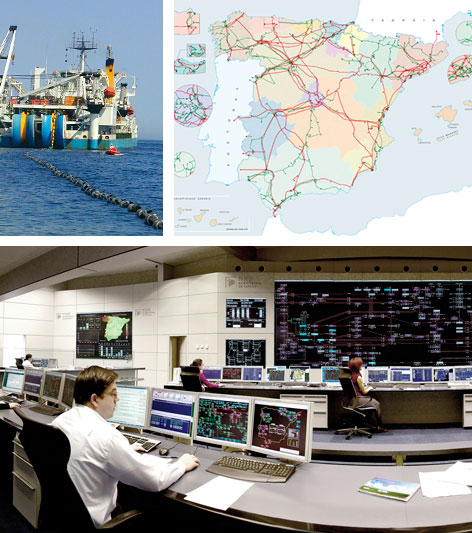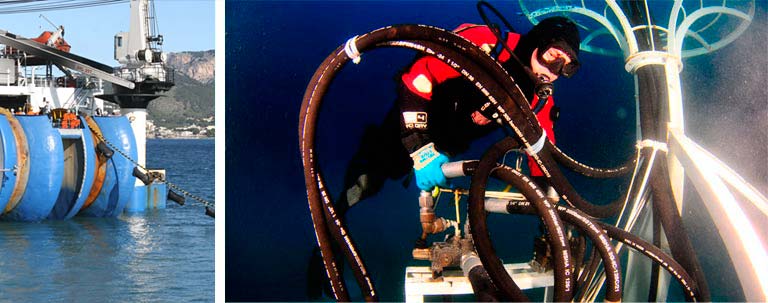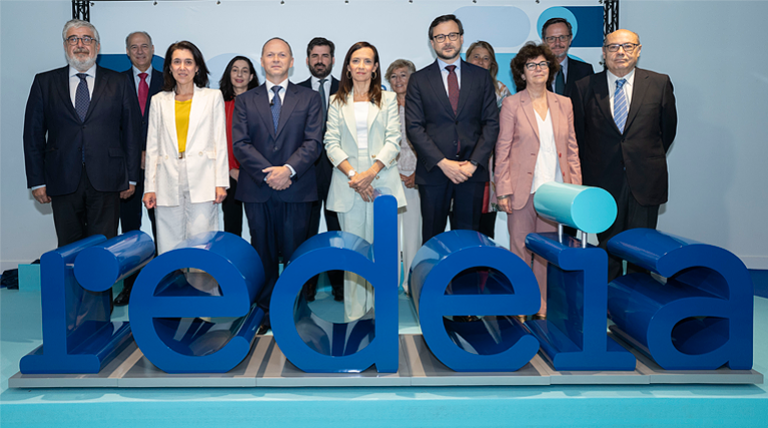We are a global operator of essential infrastructure
Red Eléctrica is created as a company with a majority of public capital, made up of capital contributions of a group of public electric utilities (Endesa and ENHER) and private electric utilities (Iberduero, Hidroeléctrica Española, FECSA and Unión Fenosa, amongst others). The INI (Instituto Nacional de Industria), the predecessor of SEPI (State-owned Industrial Holding Company), held a direct shareholding of 1%.
The Company started off with a workforce of 93 people and 10,500 km of high voltage electricity line provided by the electric utility companies. At the head of the company, a woman, Paulina Beato, who was the chairwoman until 1988.

The first control centre display panel of Red Eléctrica in Madrid. Map of the transmission grid map in 1985.

Head Office building in Madrid.
The 1990s
These are the years of consolidation of Red Eléctrica, in which the Company faces numerous challenges: taking control of the acquired HV grids, the development and expansion of the transmission grid, the signing of several electricity supply agreements with neighboring countries, the construction of the new buildings (head office and regional head offices), the development of optical fiber or the Spain-Morocco submarine interconnection, the first between two continents.
In 1997, Law 54/1997, regarding the Electricity sector, is passed ratifying the functions of the Company and confirming its role as key player in the operation of the electricity system.
During this period (until 1997) the Company is chaired by Jorge Fabra.
The 2000s
Following the IPO, in this decade changes occur in the Company shareholding, which will eventually reduce the share capital of the public administration, in other words, that of SEPI (Spanish State-owned Holding Company) to 20% and the left over 80% remains as free float. In addition, the Company begins trading on the selective IBEX 35.
In this period, the Company's international expansion also begins with the investment in the Peruvian company REDESUR. It is the first step in the founding of Red Eléctrica Internacional (2001), subsequently the Bolivian company "Transportadora de Electricidad" (TDE) is acquired.

Installation of the submarine cable. Spain-Morocco interconnection. Electricity Control Centre (CECOEL) and Control Centre of Renewable Energies (CECRE).
At a national level, work regarding renewable energy becomes ever more relevant during these years, therefore the Cecre (Control Centre of Renewable Energies) was created in 2006, a pioneering centre for the control and integration of renewable energy. This same year, the Company commences its role as operator of the electricity systems in the Canary Islands, the Balearic Islands, Ceuta and Melilla. In 2007, Law 17/2007 is passed, which converts Red Eléctrica into the sole transmission agent and operator (TSO) of the Spanish electricity system.
During this period, some major international interconnection projects are undertaken, such as the installation of the second submarine interconnection cable with Morocco. In 2008, INELFE is created, a joint venture 50% owned by Red Eléctrica and 50% by the French operator (RTE), in order to carry out the new electricity interconnection with France.
In 2008, the organisational structure of the Company transforms into a holding structure, in which Red Eléctrica Corporación is the parent company and has the following dependant subsidiaries: Red Eléctrica de España, responsible for the electricity activities in Spanish territory, and Red Eléctrica Internacional, responsible for the Group’s activities outside of Spain.
During these years the Company is chaired by Pedro Mielgo (1997-2004) and Luis Atienza (2004-2012).
From 2010 to 2015
Following the asset acquisition, in 2011 the Grid Asset Improvement project is implemented to adapt island facilities to the quality standards of mainland infrastructures.
In 2012, the milestone of the Peninsula-Balearic Island electricity interconnection—a global benchmark for its uniqueness and technical complexity—is reached. In May 2012, the company suffers the nationalisation of the subsidiary TDE (Transportadora de Electricidad) by the Bolivian government.
In 2013, the new Spanish Electricity Sector Act (Ley del Sector Eléctrico) takes effect, making the company the sole transmission agent and operator of the Spanish electricity system. On 27 December 2013, the Council of Ministers approves the Royal Decree establishing a new remuneration framework for electricity transmission activity in Spain—a remuneration model with a clearer, more stable and more transparent methodology.
Also in 2013, the Shareholders’ Meeting approves the creation of the Independent Coordinator Director, in accordance with international best practices in corporate governance.
In 2014, the transmission grid is reinforced by the commissioning of 621 km, including the new interconnection with Portugal through the 400 kV Puebla de Guzmán-Tavira axis and the laying of submarine cables for the Ibiza and Majorca interconnection.
In November 2014, the company acquires the assignment of rights and the use of ADIF’s commercial fibre optic network for the next 20 years. This diversification operation makes Red Eléctrica a neutral and independent operator in this segment of the telecommunications market, assuming a role similar to the one it performs in the electricity sector.
On 13 November 2014, a definitive agreement is reached with the Bolivian government for economic compensation following the nationalisation of the company TDE.
In December 2014, Red Eléctrica is awarded the European Business Award for the Environment in the special category of Business and Biodiversity for its project ‘Birds and power lines: Mapping of bird flight paths’.
In 2015, the milestone of the Spain-France underground interconnection is achieved, a pioneering project that doubles the electricity exchange capacity between France and Spain. In addition, two new subsidiaries are created: Reintel (Red Eléctrica Infraestructuras de Telecomunicación) to provide telecommunication services, and Reincan (Red Eléctrica Infraestructuras en Canarias) to promote energy storage projects, like system operator tools, in the Canary Islands.
Internationally, in 2015 the company establishes its presence in Peru with new line concessions, and enters the transmission business in Chile.
Red Eléctrica has a workforce of over 1,700 employees and manages more than 42,000 km of power lines.
José Folgado has served as chairman of Red Eléctrica since 2012.

Laying of the submarine cable.Peninsula-Balearic Island interconnection.
Since 2016
In the telecommunication business, the company’s subsidiary, Reintel, has established itself as Spain’s benchmark neutral operator, running a dark fibre optic network that extends more than 33,000 km.
On the international front, in Chile, Red Eléctrica Chile has formalised the acquisition of 50% of TEN, the company responsible for building the Mejillones-Cardones interconnection line that links Chile’s northern and central electricity subsystems. Moreover, Red Eléctrica Chile, in a 70/30 consortium with Cobra, Instalaciones y Servicios, has been awarded the contract for the execution and subsequent operation of more than 258 kilometres of power lines in Chile in an international public tender conducted by the Centro de Despacho Económico de Carga del Sistema Eléctrico del Norte Grande (SING). The company has also expanded its presence in Peru, where it owns Red Eléctrica Andina (REA) and Red Eléctrica del Sur (REDESUR), thus managing more than 1,300 km of circuit.
In the field of energy storage in the Canary Islands, the permitting and public disclosure processes for the Soria-Chira pumped-storage hydropower station have begun. This new facility is an essential element in the advancement toward a more sustainable energy model in the Canary Islands.
In 2016, the process of fully decoupling the powers of the company Chairman and those of the CEO, Mr. Juan Lasala Bernad, was finalised.
In 2017, the commitment to sustainability that Grupo Red Eléctrica has maintained throughout its corporate history obtained clear support with its recognition as the top company in the world in sustainability in the Electric Utilities sector by the Dow Jones Sustainability Index (DJSI), and leading the Utilities super-sector, which encompasses the electricity, gas and water sectors. In addition, the company took a leap in the management of this area with the design of the Grupo Red Eléctrica 2030 Sustainability Commitment: a transverse commitment with long-term vision consistent with the company’s strategy.
In 2017, the commitment to sustainability that the Red Eléctrica Group has been embracing and fulfilling ever since it began its business activity and operations has obtained clear support through the recognition as the top company in the world in sustainability in the Electric Utilities sector by the Dow Jones Sustainability Index (DJSI) and has led the Utilities super-sector, which encompasses the electricity, gas and water sectors. In addition, the Company has taken a leap forward in the management of this area with the definition of the 2030 Sustainability Commitment of the Red Eléctrica Group; a corporate commitment that is cross-cutting in nature and with a long-term vision that is aligned with the Company's strategy.
In July 2018, the Board of Directors of Red Eléctrica Corporación appointed Jordi Sevilla as the new Chairman of the Red Eléctrica Group. Jordi Sevilla took over this role replacing José Folgado, who had been in charge of the Company since 2012.
In December 2018, a Sustainability Commission was created within the Board of Directors, which was created with the aim of generating a proactive attitude to integrate sustainability into the organization's decision-making processes.
In early 2019, Red Eléctrica Corporación (REC) has reached an agreement with Albertis Infraestructuras, S.A. whereby REC, through its subsidiary Red Eléctrica Sistemas de Telecomunicaciones (RESTEL), acquired 89.68% of the shareholding of Hispasat S.A., for an amount totalling €949 million. By means of this transaction, the Red Eléctrica Group consolidates itself as a global operator of strategic infrastructure both in Spain and abroad, not only through the management and operation of electricity transmission grids but also of fibre optic networks and satellites.
In May 2019, the Board of Directors of Red Eléctrica Corporación has agreed to appoint Roberto García Merino as the new CEO of the Group and has approved the creation of the new technology company of the Red Eléctrica Group. This new company has been created within the framework of the 2018-2022 Strategic Plan to promote innovation in the fields of electricity and telecommunications.
In January 2020, Red Eléctrica Corporación, S.A.’s Board, in the meeting held on 28 January, recorded the irrevocable resignation tendered by Jordi Sevilla Segura from his directorship and, as a consequence, from his position as non-executive chairman of the Board and of the Company.
The Board of Directors of Red Eléctrica Corporación, S.A., at its meeting held on 25 February 2020, has adopted the appointment Ms. Beatriz Corredor Sierra as Director of Red Eléctrica Corporación, S.A., in the category of “other external” directors, until the first General Shareholders' Meeting is held, in order to cover the vacancy existing on the Board of Directors as a result of the resignation tendered by Mr. Jordi Sevilla Segura.














